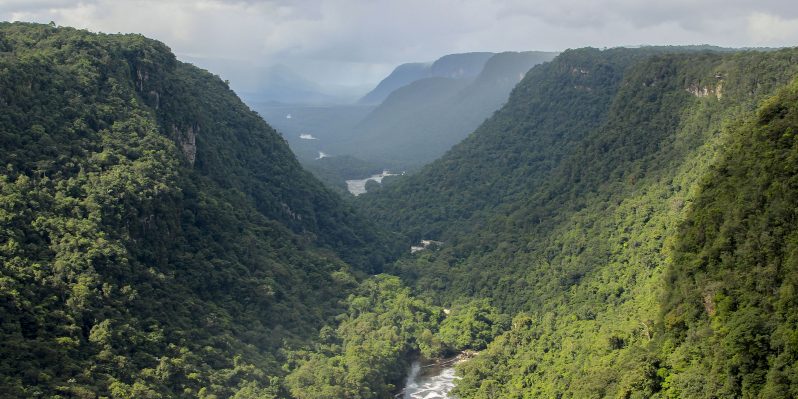Guyana has accessed carbon market finance for success in protecting and restoring forests, and leads the world as 14 other countries and large sub-national jurisdictions are working towards TREES credits, a release from the Architecture for REDD+ Transactions (ART) said today.
See full statement below:
The Architecture for REDD+ Transactions (ART) has issued the world’s first TREES credits to Guyana. This also marks a milestone as the first time a country has been issued carbon credits specifically designed for the voluntary and compliance carbon markets for successfully preventing forest loss and degradation — a process known as jurisdictional REDD+.
Following completion of an independent validation and verification process and approval by the ART Board of Directors, ART has issued 33.47 million TREES credits to Guyana for the five-year period from 2016 to 2020.
These serialized credits, listed on ART’s public registry, are available to buyers on the global carbon market, including for use by airlines for compliance with the International Civil Aviation Organization’s global emission reduction programme, CORSIA, as well as for use toward voluntary corporate climate commitments.
Guyana’s completion of the ART process paves the way for other governments that are looking to receive carbon market finance for success in protecting and restoring forests. Currently, 14 other countries and large sub-national jurisdictions are working toward their own issuances of TREES credits.
Frances Seymour, the Chair of the ART Board, congratulated the Government of Guyana and the many domestic stakeholder groups who contributed to this achievement, which recognizes the success the country has had in protecting its forests.
“Guyana is the first to complete the ART process for generating high-integrity, Paris Agreement-aligned carbon credits that will allow the country to access market-based finance to continue to implement forest stewardship strategies. ART, other governments, and important stakeholder groups, especially Indigenous Peoples and local communities, around the world can now build on Guyana’s experience to accelerate progress towards meeting global forest and climate goals in ways that ensure environmental and social integrity.”
Vice President of Guyana, Dr. Bharrat Jagdeo lauded Guyana’s leadership and tenacity, which started in 2007 when Guyana set out a far-reaching vision for how national scale action on forests could unlock huge global benefits in the fight against climate change, the preservation of biodiversity, and building energy and food security.
The Vice President stressed that ambitious progress was possible – in Guyana and elsewhere – if the peoples of forest countries designed their own way forward so that action on forests boosted their legitimate development aspirations.
“The people of Guyana continue to be willing to play their part – but we also need international standards that keep pace with what science tells us is needed to safeguard the world’s vital tropical forests.
So, we are pleased that ART-TREES was created to help accelerate global climate action – by recognizing what forest countries like Guyana have long called for: that the time for small-scale pilots and projects is long past, the world needs jurisdiction-scale action to make the required impact, and the world also needs to value the ecosystem services that tropical forests provide.
Today, the vision set out in 2007 moves to the next phase – where payments for forest climate services can be sourced from global carbon markets. We are pleased that the vision of fifteen years ago moves forward in a major way today,” the Vice President said.
The independent validation and verification process was conducted by Aster Global Environmental Services, Inc., an internationally accredited environmental services company, which audited Guyana’s REDD+ results for conformance with both the carbon accounting requirements and the rigorous social and environmental safeguards of TREES.
On behalf of his colleagues, the Chair of the National Toshaos’ Council in Guyana, Toshao Derrick John said, “The National Toshaos’ Council welcomes this important milestone in Guyana’s programme on Low Carbon Development which will further support the development of sustainable livelihoods and protection of forests within indigenous communities.
Endorsement for the government to sell credits from Guyana’s Indigenous lands — both titled and untitled – including the terms of benefit sharing, was given by the National Toshaos’ Council, which includes leaders elected by each community and is the legal representative of Indigenous peoples in Guyana.
Guyana’s TREES credits are also the first market-ready credits issued to a jurisdiction classified as “High Forest, Low Deforestation” (HFLD), which means it has high forest cover and low historical rates of deforestation. Carbon markets have historically focused predominantly on areas that have already experienced high rates of deforestation. This is now starting to change with the first TREES credits issued to Guyana.
Prior to the crediting approach in TREES, there had not been a market-oriented approach that allows HFLD jurisdictions to benefit from carbon market finance. The HFLD crediting approach in TREES recognizes that HFLD jurisdictions must continue to aggressively protect forests to avoid deforestation and degradation, and that carbon market finance can be a powerful incentive to help achieve this. All HFLD credits are tagged as such on ART’s public registry.
Mary Grady, Executive Director of the ART Secretariat, said, “Our planet’s last intact forests are under mounting threat of irreversible, permanent loss if new approaches to protect them are not urgently supported. Without the proper financial incentives to value forests and the actions that protect them, there is no guarantee that forests in HFLD areas will remain standing in the long run. Providing a pathway that incentivizes jurisdictions to keep their forests standing will create a more effective and equitable global system for forest protection and restoration.”



.jpg)








